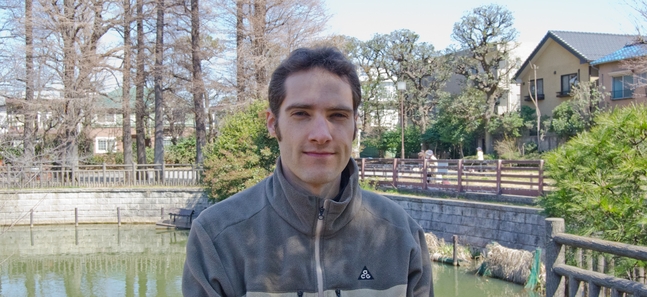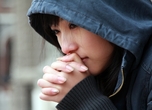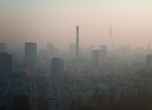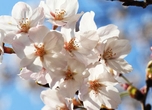
Posted: Fri Mar 18 2011
Real name: Joseph Tame
Twitter name: @tamegoeswild
Location: Meguro, Tokyo
Occupation: I’m a Digital Media Producer.
Where were you at the time of the quake?
I was at Shibuya Station. My report can be found here.
At what point did you think to get on Twitter, and why did that make sense to you?
Immediately. It's a natural response when an earthquake strikes. There are a few reasons for that: Firstly, Twitter is often the quickest way to get details of quake thanks to @earthquake_jp – quicker than the met office website (and we don't have a TV); secondly, you can immediately see if your friends are OK, and see the extent of the quake; thirdly, you can immediately inform family and friends that you're fine.
Since then, what has daily life been like for you around Tokyo?
The scene on Friday evening in Shibuya was surreal – very long queues for buses that couldn't get anywhere in the traffic jams; thousands of people stranded. More than that, though, it felt very strange to find ourselves part of a human river walking home from Shibuya Station – something out of a Hollywood movie.
Then there was the gasoline shortage. I spent literally six hours looking for gasoline and gasoline cans on Sunday in preparation for our trip to the north [Joseph was aiding a crew of reporters heading to the stricken region]. Cans were sold out across the city and new stocks were not due in until the end of the week. Eventually, I was able to borrow one from a friend who runs a delivery business, but even then we were limited to 2,000 yen’s worth of fuel.
We travelled north to the Koriyama Evacuee Centre, 70km from the Fukushima plant. Not far outside Tokyo we saw a convoy of JSDF vehicles rolling up the motorway (closed to regular traffic) that was the first sign of the relief effort underway in the north.
In Koriyama, they had a location set up to receive people who may have been exposed to radiation. Seeing the team dressed in full anti-radiation suits scanning families with geiger counters was a bit of a shock – like a scene out of ET. We watched as a family of four (and their dog) were checked over. Mother, son and granny were OK, but radiation was found on the father's trousers. He was taken to the tents, his clothes disposed of, and he was washed down.
Speaking to them afterwards, they were all remarkably relaxed – the father was even joking with me. He talked about what they were going to do now, having had to leave their house a few kilometres from the plant. He said that friends were taking them in. They had no idea if or when they might be able to return home.
Speaking to officials, I was told that 144 of the 4,295 people that had been scanned that day (Monday) had tested positive, but they were all minor cases such as the one we'd just witnessed. There were no cases that required isolation.
We then went to one of the evacuee centres and interviewed doctors, staff, and evacuees. The doctor's main concern was not radiation issues, but the psychological effects of the quake and tsunami that will follow, such as Post Traumatic Stress Disorder.
Overall, the place was incredibly calm. The Self Defense Force were running the water distribution point. Food, blankets, emergency toilets being given out, and baseball batting halls had become home to many. ‘All anyone is thinking is how they can help those around them,’ I was told. ‘No-one's thinking about themselves.’
Speaking to a 16-year-old, he told us of the moment the quake hit and how frightened he was. He managed to get out with his family without being hurt and immediately came to the evacuee centre. After several days there, all he wanted was for life to go back to normal, which was simply not possible with his house damaged and aftershocks continuing. ‘I used to hate going to school,’ he said, ‘but now all I want is to go back, study hard and see my friends.’
We were due to head further north, but doing so would mean we wouldn't have enough fuel to get back home. On the way up we'd only seen a couple of petrol stations that were open. One of them was only allowing you 1,000 yen of fuel. Without fuel or a backup team, and with the uncertainty over the nuclear plant, the tough decision was made to leave the area.
Koriyama itself had limited damage. We saw a couple of four-storey buildings that had completely collapsed, but other than that it was more houses that had lost cladded walls, etc. The main problem was the lack of essential services, such as water.
What sources have you found indispensable in order to keep your Twitter followers up to date?
Aside from my experience travelling north, phone calls with friends in affected areas, and other Twitter users tweeting in both Japanese and English. Martyn Williams should be applauded for the work he's doing, as should Time Out Tokyo for providing accurate information on how best we can help. On the other hand, I’m not paying attention to sensational coverage by the likes of the Associated Press, and – to a certain extent – the New York Times. I’ve been listening to advice from nuclear experts from a variety of sources.
Honestly now, had you heard of a sievert before Saturday?
No!
Many people are concerned about Tokyo's safety. At the time of writing, what's your position concerning the evacuation of the capital?
I believe what all the experts are saying (that doesn’t necessarily include the Japanese government) – we're safe. I'm staying. I met people who had been exposed to radiation in the north. Unless you're extremely close to the plant, the amounts we're talking about are not harmful to human health.
I was at Narita Airport yesterday dropping off a journalist, and I was struck by how quiet arrivals was, and how busy departures was. It seems the majority of people who are leaving are foreign nationals, plugged into the sensationalist foreign media.
Are there any charities or NPOs you're particularly advising?
I’ve been recommending people to use the charities on the Time Out Tokyo site, or this page.
All being well, what are you looking forward to most in Tokyo's near future?
The arrival of sakura.
◄ Previous | Now showing 3 of 6 | Next ►
Tweets
- About Us |
- Work for Time Out |
- Send us info |
- Advertising |
- Mobile edition |
- Terms & Conditions |
- Privacy policy |
- Contact Us
Copyright © 2014 Time Out Tokyo














Add your comment